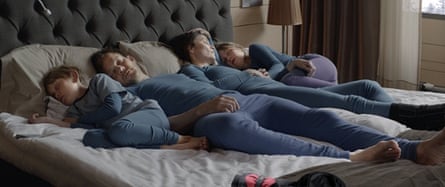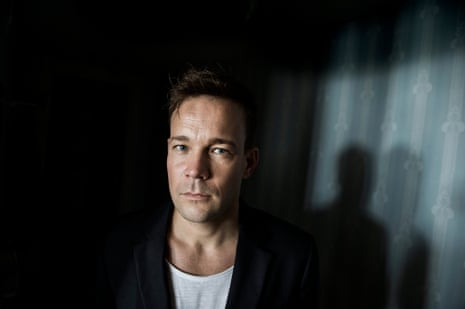He has played literature’s most famous predatory paedophile in Lolita; a transsexual glam rocker in Hedwig and the Angry Inch; and a gay man living a double life in The Pride. But according to Johannes Bah Kuhnke, none of these roles has challenged his masculinity, or indeed drawn as much disdain from the audience as Tomas, the attractive, well-to-do family man whose sense of self is so mercilessly torn apart in Force Majeure, the celebrated new film by Swedish director Ruben Östlund, which has received rave reviews since its release in the UK.
Tomas is on a skiing holiday in the Alps with his Norwegian wife and two children when an avalanche roars towards the mountaintop cafe where they are having lunch, for one horrifying instant appearing as if it is going to wipe them all out. Instead of rushing to save his family, Tomas panics and runs, and the emotional fallout from this momentary failure becomes more and more excruciating to observe throughout the film.
“The funny thing is that people hate Tomas more than they hated Humbert Humbert [Lolita’s protagonist], and that’s quite sick,” says Bah Kuhnke, 43. “Cowardice is so provocative to people. Perhaps it’s because they are confronted with their own cowardice and nobody sees themselves as a coward. That’s why they have so much hate for Tomas, why their reaction to the character is so strong.”
The family’s horrible predicament seems to resonate across cultures, with the film now sold in around 70 countries. “I thought it would be like all these arthouse films. It would get good critics but no one will see it,” Bah Kuhnke says. “But it’s a long time after our premiere in Cannes now and it’s still rolling outside of Sweden.”
For Bah Kuhnke, Tomas’s weakness is not a momentary failure of nerve. “If you look at the statistics, most people would have run. What makes him weak is his inability to confront his fear afterwards.”
Tomas at first questions his wife’s perception of events, forcing her to out him for his cowardice on two consecutive nights out with other couples, putting her husband under increasing pressure, until a video recorded on his mobile phone finally decides the matter, sending him into a crisis.
Playing such an ignoble character was unexpectedly challenging, even for an actor who has taken lead roles at Stockholm’s City Theatre for more than a decade. “The thing with acting is that you can play the better part of yourself. You can be funnier, stronger, more badass, more poetic. But in this case I had to put out the lower version of myself, and you’re not used to seeing that.”
What he struggled most with was the way Tomas failed to live up to fundamental expectations people have of men. “I thought I was kind of ‘free’ as a man. I did Hedvig and the Angry Inch and a lot of roles where I challenge male gender, but there you always play some kind of strong person,” he says. “Even I was confronted by the weakness or cowardice of this character, so I did my best to defend this character, but I had a hard time doing it.”
During the month the cast spent filming the interior scenes marooned in a luxury hotel in the Swedish mountains, he found himself increasingly oppressed by the character. “I had this Tomas guy’s clothes and between the shots I was trying to throw him off and be this cool guy, but after just a week I thought, ‘Nobody sees me as anything but this guy anyway’, so I just went into the character. It was a kind of not-chosen method acting.”
On location in the French resort of Les Arcs, his rudimentary skiing abilities were the problem, particularly in the scenes where Tomas and his Norwegian friend Mats indulge themselves in a day of extreme off-piste skiing and primal screaming.

“When we were casting, Ruben asked me ‘Are you a good skier?’ and I looked back to him and said ‘Yes, of course, I’m from the north of Sweden. I was born on skis’,” Bah Kuhnke remembers gleefully. “Then on the first day, when we got to France, I said, ‘You know the thing I said about skiing; I lied to you to get the part’.”
He doesn’t want to overemphasise the hard work and excruciating subject matter. “The second time I saw it, I was so scared that this is some kind of Scandinavian humour no one would get, that they would think it was angst all the way and no one would laugh.”
Östlund appears to take a sadistic glee in torturing his characters, with the hapless Tomas his principal victim. “I found that on set he was laughing behind the screen and rubbing his hands out of joy at humiliating this character. Ruben would say, ‘You can’t sit like that. Can you sink your body to a special victim position?’”
He would also frequently send him YouTube videos and pictures he had found, to help him capture Tomas’s hunted and deflated look as he loses face over the five-day holiday: “He sent me pictures of devastated men, like the golf player Tiger Woods when he was confronted with the fact that he was a sex addict. We were inspired also by the captain of Costa Concordia, the one who flew from the ship.”
To prepare him for an agonising crunch point of the film, when Tomas sits weeping on the floor as his wife gazes down detachedly, Östlund sent him another clip. “We wanted it to be over the top, so he sent me a YouTube video which is called ‘Worst Man Cry Ever’.” It’s obviously something of an obsession, because when Östlund missed out on an Oscar nomination for the film in January he uploaded his own YouTube video entitled “Force Majeure, Worst Man Cry Ever, Most shocking snubs of the 2015 Oscar Nominations”, in which viewers can hear his own off-screen whimpering, howling breakdown of disappointment.
The film is as much about the suffocating nuclear family in which Tomas and Ebba are trapped as it is about male weakness, however. When the Swedish newspaper Svenska Dagbladet visited Östlund on the set in Les Arcs, he told the reporter: “We live in the most conservative nuclear family time ever. For me, the film is such an obvious attack on this lifestyle.” He added that the film had three ambitions: “To reduce alpine tourism, increase divorce rates, and make the most spectacular avalanche scene in history.”

The producers first approached the French resort of Avoriaz, but when officials read the script they turned the film down. “It came back with a note: ‘Smog, avalanche, family disaster. We don’t think so’,” he laughs.
On the face of it, though, Bah Kuhnke is part of a nuclear family himself. He lives in Stockholm with his wife Alice, a former children’s TV celebrity who last October became Sweden’s minister of culture, and their three children. “We’re very untraditional in our marriage,” he protests. “Our children have us both, but not at the same time, so when she comes I go, and when I come she goes. Maybe that’s why we’re still together,” he laughs. “We haven’t got bored of each other, because we never see each other.”
Nonetheless, he admits that his 12 years of marriage have provided some material for the film. “I was stealing a lot from the shitty side of my marriage, and the shitty side of my friend’s marriages,” he says.
In the weeks before he went to Les Arcs, he decamped to Lanzarote with his family on an all-inclusive package holiday, giving him a chance to scrutinise other families enjoying “quality time”.
To capture how much the couple in the film take each other for granted, Bah Kuhnke and Lisa Loven Kongsli, the Norwegian actress who plays Ebba, Skyped each other for an hour every day for months before the shoot. “We wanted to tear down any curiosity we had about each other,” he claims. “I think it worked, because after just two weeks I was like, ‘Ah fuck, now I’ve got to Skype Lisa again’. So we were almost bored with each other by the time we started the film.”
Bah Kuhnke believes people have become myopically obsessed with the internal dynamics of their own families: “The whole of society is looking so much into the nuclear family. The tabloids are so full of it and it’s kind of pathetic. The criticism in the film is like, ‘Why don’t we raise our heads a little higher and talk about something else than just our marriage?’ I mean, come on.”

Comments (…)
Sign in or create your Guardian account to join the discussion